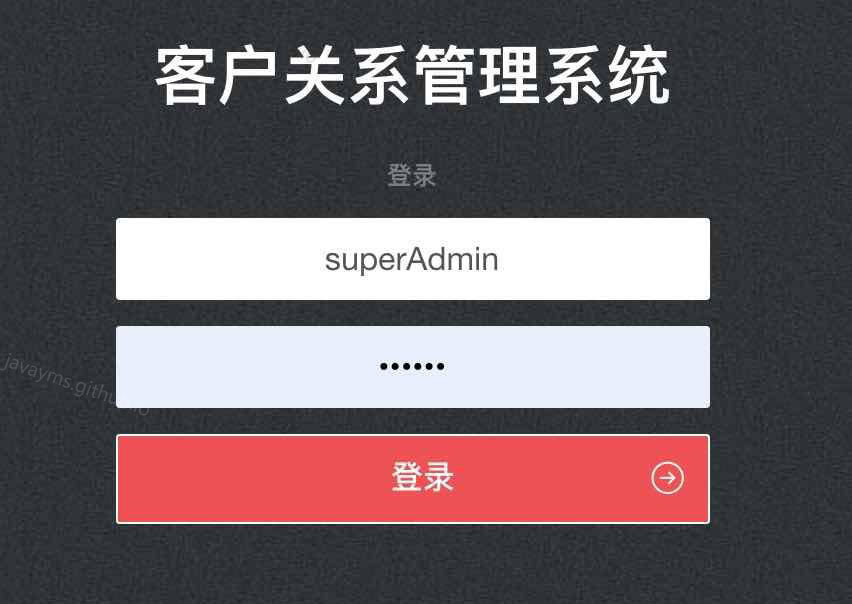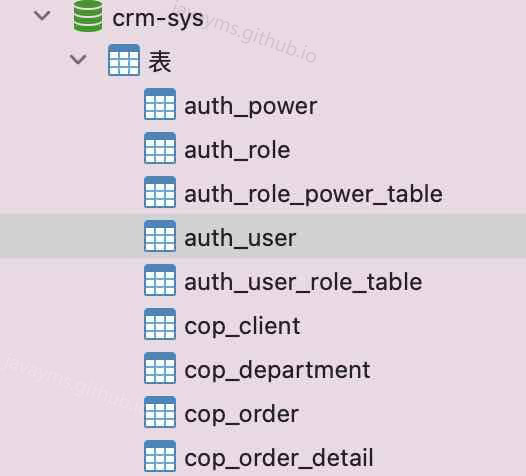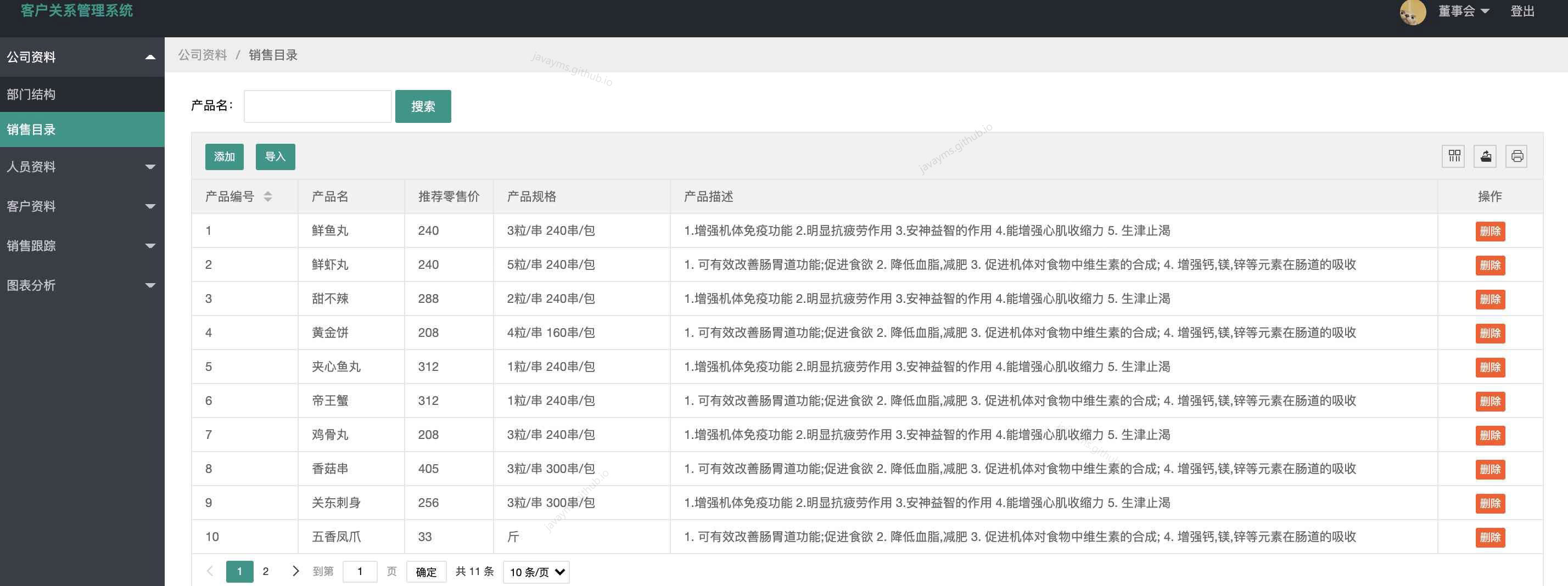基于javaweb的客户关系管理系统(java+springboot+layui+html+mysql)
运行环境
Java≥8、MySQL≥5.7
开发工具
eclipse/idea/myeclipse/sts等均可配置运行
适用
课程设计,大作业,毕业设计,项目练习,学习演示等
功能说明






基于javaweb+SpringBoot的客户关系管理系统(java+SpringBoot+layui+html+maven+mysql)
项目介绍
CRM客户关系管理系统。本系统共分为三种角色:超级管理员、经理、销售人员; 超级管理员的功能主要有: 公司资料:部门结构、销售目录; 人员资料:销售人员、账号权限; 客户资料:客户列表; 销售跟踪:订单列表、报表统计;
图表分析:销售与客户分析、销售失败分析;
环境需要
1.运行环境:最好是java jdk 1.8,我们在这个平台上运行的。其他版本理论上也可以。 2.IDE环境:IDEA,Eclipse,Myeclipse都可以。推荐IDEA; 3.tomcat环境:Tomcat 7.x,8.x,9.x版本均可 4.硬件环境:windows 7/8/10 1G内存以上;或者 Mac OS; 5.是否Maven项目: 是;查看源码目录中是否包含pom.xml;若包含,则为maven项目,否则为非maven项目 6.数据库:MySql 5.7版本;
技术栈
- 后端:SpringBoot; 2. 前端:layui+html
使用说明
- 使用Navicat或者其它工具,在mysql中创建对应名称的数据库,并导入项目的sql文件; 2. 将项目中application.yml配置文件中的数据库配置改为自己的配置 3. 使用IDEA/Eclipse/MyEclipse导入项目,Eclipse/MyEclipse导入时,若为maven项目请选择maven;若为maven项目,导入成功后请执行maven clean;maven install命令,配置tomcat,然后运行; 4. 运行项目,输入localhost:8080 登录 5. 管理员账户:superAdmin 密码123456 经理账户:user 密码:123456
6.销售人员账户:laji_ma 密码:123456
用户管理控制层:
@Controller
@RequestMapping(“/customer”)
public class CustomerController extends AuthorizedController {
@Autowired
private CustomerService customerService;
@RequestMapping(value = “”, method = RequestMethod.GET)
public String customer() {
return “crm/customer”;
@RequestMapping(value = “/find”, method = RequestMethod.POST)
@ResponseBody
public PageInfo find(@RequestBody QueryCustomerVo vo) {
return customerService.find(vo);
@RequestMapping(value = “/findAllCustomerCategory”, method = RequestMethod.POST)
@ResponseBody
public List findAllCustomerCategory() {
return customerService.findAllCustomerCategory();
@RequestMapping(value = “/findAllIndustry”, method = RequestMethod.POST)
@ResponseBody
public List findAllIndustry() {
return customerService.findAllIndustry();
@RequestMapping(value = “/findAllSource”, method = RequestMethod.POST)
@ResponseBody
public List findAllSource() {
return customerService.findAllSource();
@RequestMapping(value = “/add”, method = RequestMethod.POST)
@ResponseBody
public Result add(@RequestBody Customer customer) {
customer.setCreateBy(getUser().getUserId());
return customerService.insert(customer);
@RequestMapping(value = “/checkCustomerName”, method = RequestMethod.POST)
@ResponseBody
public Result checkCustomerName(@RequestBody Customer customer) {
return customerService.checkCustomerName(customer);
@RequestMapping(value = “/findById”, method = RequestMethod.POST)
@ResponseBody
public Customer findById(@RequestBody Customer customer) {
return customerService.findById(customer.getCustomerId());
@RequestMapping(value = “/update”, method = RequestMethod.POST)
@ResponseBody
public Result update(@RequestBody Customer customer) {
return customerService.update(customer);
@RequestMapping(value = “/dashboard/{customerId}”, method = RequestMethod.GET)
public ModelAndView dashboard(@PathVariable int customerId) {
ModelAndView vm = new ModelAndView(“crm/customerDashboard”);
vm.addObject(“customerId”, customerId);
return vm;
@RequestMapping(value = “/updateStar”, method = RequestMethod.POST)
@ResponseBody
public Result updateStar(@RequestBody Customer customer) {
return customerService.updateStar(customer);
@RequestMapping(value = “/updateLocation”, method = RequestMethod.POST)
@ResponseBody
public Result updateLocation(@RequestBody Customer customer) {
return customerService.updateLocation(customer);
系统用户管理控制层:
@Controller
@RequestMapping(“/user”)
public class UserController extends AuthorizedController {
@Autowired
private UserService userService;
@Autowired
private HttpSession session;
@RequestMapping(value = “”, method = RequestMethod.GET)
public String index() {
return “sys/user”;
@RequestMapping(value = “/find”, method = RequestMethod.POST)
@ResponseBody
public PageInfo find(@RequestBody QueryUserVo vo) {
return userService.find(vo);
@RequestMapping(value = “/add”, method = RequestMethod.POST)
@ResponseBody
public Result add(@RequestBody User user) {
return userService.insert(user);
@RequestMapping(value = “/remove”, method = RequestMethod.POST)
@ResponseBody
public Result delete(@RequestBody List ids) {
return userService.deleteByIds(ids);
@RequestMapping(value = “/findById”, method = RequestMethod.POST)
@ResponseBody
public User findById(@RequestBody User user) {
return userService.findById(user.getUserId());
@RequestMapping(value = “/update”, method = RequestMethod.POST)
@ResponseBody
public Result update(@RequestBody User user) {
Result result = userService.update(user);
if (result.isSuccess() && user.getUserId() == getUser().getUserId()) {
session.setAttribute(“User”, userService.findById(getUser().getUserId()));
return result;
@RequestMapping(value = “/updateStatus”, method = RequestMethod.POST)
@ResponseBody
public Result updateStatus(@RequestBody User user) {
return userService.updateStatus(user);
@RequestMapping(value = “/checkUserName”, method = RequestMethod.POST)
@ResponseBody
public Result checkUserName(@RequestBody User user) {
return userService.checkUserName(user);
@RequestMapping(value = “/resetPassword”, method = RequestMethod.POST)
@ResponseBody
public Result resetPassword(@RequestBody User user) {
return userService.resetPassword(user);
@RequestMapping(value = “/profile”, method = RequestMethod.GET)
public String profile() {
return “sys/profile”;
@RequestMapping(value = “/updatePassword”, method = RequestMethod.POST)
@ResponseBody
public Result updatePassword(@RequestBody UpdatePasswordVo vo) {
return userService.updatePassword(vo);
系统角色管理控制层:
@Controller
@RequestMapping(“/role”)
public class RoleController extends AuthorizedController {
@Autowired
private RoleService roleService;
@RequestMapping(value = “”, method = RequestMethod.GET)
public String index() {
return “sys/role”;
@RequestMapping(value = “/findAll”, method = RequestMethod.POST)
@ResponseBody
public List findAll() {
return roleService.findAll();
@RequestMapping(value = “/checkRoleName”, method = RequestMethod.POST)
@ResponseBody
public Result existRoleName(@RequestBody Role role) {
return roleService.checkRoleName(role);
@RequestMapping(value = “/add”, method = RequestMethod.POST)
@ResponseBody
public Result add(@RequestBody Role role) {
return roleService.insert(role);
@RequestMapping(value = “/remove”, method = RequestMethod.POST)
@ResponseBody
public Result delete(@RequestBody List ids) {
return roleService.deleteByIds(ids);
@RequestMapping(value = “/findById”, method = RequestMethod.POST)
@ResponseBody
public Role findById(@RequestBody Role role) {
return roleService.findById(role.getRoleId());
@RequestMapping(value = “/update”, method = RequestMethod.POST)
@ResponseBody
public Result update(@RequestBody Role role) {
return roleService.update(role);
@RequestMapping(value = “/user/{roleId}”, method = RequestMethod.GET)
public ModelAndView roleUser(@PathVariable int roleId) {
ModelAndView vm = new ModelAndView(“sys/roleUser”);
vm.addObject(“roleId”, roleId);
return vm;
@RequestMapping(value = “/user/findUserInRole”, method = RequestMethod.POST)
@ResponseBody
public PageInfo findUserInRole(@RequestBody QueryRoleUserVo vo) {
return roleService.findUserInRole(vo);
@RequestMapping(value = “/user/remove”, method = RequestMethod.POST)
@ResponseBody
public Result deleteRoleUser(@RequestBody RoleUser roleUser) {
return roleService.deleteRoleUser(roleUser);
@RequestMapping(value = “/user/findUserNotInRole”, method = RequestMethod.POST)
@ResponseBody
public PageInfo findUserNotInRole(@RequestBody QueryRoleUserVo vo) {
return roleService.findUserNotInRole(vo);
@RequestMapping(value = “/user/add”, method = RequestMethod.POST)
@ResponseBody
public Result addRoleUser(@RequestBody RoleUser roleUser) {
return roleService.insertRoleUser(roleUser);
@RequestMapping(value = “/menu/{roleId}”, method = RequestMethod.GET)
public ModelAndView roleMenu(@PathVariable Integer roleId) {
ModelAndView mv = new ModelAndView(“sys/roleMenu”);
mv.addObject(“roleId”, roleId);
return mv;
@RequestMapping(value = “/menu/saveMenu”, method = RequestMethod.POST)
@ResponseBody
public Result saveMenu(@RequestBody Map map) {
return roleService.saveRoleMenu((Integer) map.get(“roleId”), (List) map.get(“menuIdList”));
@RequestMapping(value = “/fun/{roleId}”, method = RequestMethod.GET)
public ModelAndView roleFun(@PathVariable int roleId) {
ModelAndView vm = new ModelAndView(“sys/roleFun”);
vm.addObject(“roleId”, roleId);
return vm;
系统菜单管理控制层:
@Controller()
@RequestMapping(“/menu”)
public class MenuController extends AuthorizedController {
@Autowired
private MenuService menuService;
@RequestMapping(value = “”, method = RequestMethod.GET)
public String index() {
return “sys/menu”;
@RequestMapping(value = “/findAllMenu”, method = RequestMethod.POST)
@ResponseBody
public List
return menuService.findAllMenu();
@RequestMapping(value = “/findAllMenuTree”, method = RequestMethod.POST)
@ResponseBody
public List<TreeNode
return menuService.findAllMenuTree();
@RequestMapping(value = “/findUserMenuTree”, method = RequestMethod.POST)
@ResponseBody
public List<TreeNode
return menuService.findUserMenuTree(getUser().getUserId());
@RequestMapping(value = “/findRoleMenu”, method = RequestMethod.POST)
@ResponseBody
public List
return menuService.findRoleMenu(role.getRoleId());
@RequestMapping(value = “/checkMenuName”, method = RequestMethod.POST)
@ResponseBody
public Result checkMenuName(@RequestBody Menu menu) {
return menuService.checkMenuName(menu);
@RequestMapping(value = “/checkMenuCode”, method = RequestMethod.POST)
@ResponseBody
public Result checkMenuCode(@RequestBody Menu menu) {
return menuService.checkMenuCode(menu);
@RequestMapping(value = “/add”, method = RequestMethod.POST)
@ResponseBody
public Result add(@RequestBody Menu menu) {
return menuService.insert(menu);
@RequestMapping(value = “/remove”, method = RequestMethod.POST)
@ResponseBody
public Result remove(@RequestBody Menu menu) {
return menuService.delete(menu.getMenuId());
@RequestMapping(value = “/findById”, method = RequestMethod.POST)
@ResponseBody
public Menu findById(@RequestBody Menu menu) {
return menuService.findById(menu.getMenuId());
@RequestMapping(value = “/update”, method = RequestMethod.POST)
@ResponseBody
public Result update(@RequestBody Menu menu) {
return menuService.update(menu);
@RequestMapping(value = “/up”, method = RequestMethod.POST)
@ResponseBody
public Result up(@RequestBody Menu menu) {
return menuService.up(menu.getMenuId());
@RequestMapping(value = “/down”, method = RequestMethod.POST)
@ResponseBody
public Result down(@RequestBody Menu menu) {
return menuService.down(menu.getMenuId());























 1136
1136











 被折叠的 条评论
为什么被折叠?
被折叠的 条评论
为什么被折叠?








